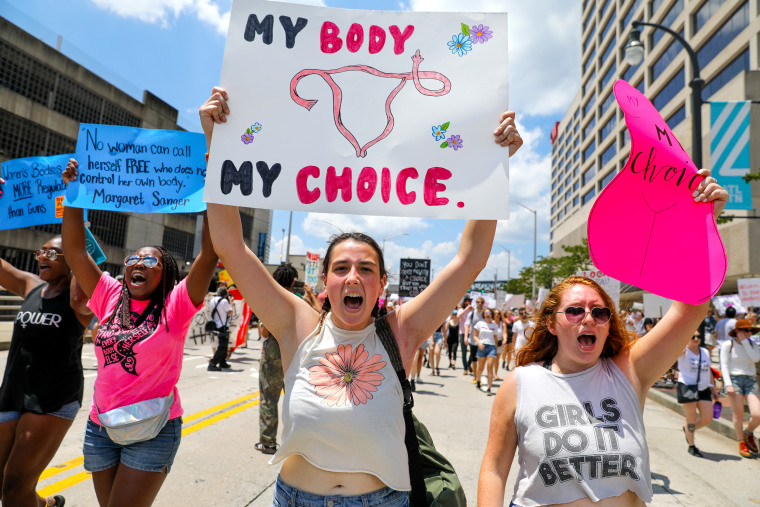America's top entertainment companies have largely stayed quiet ever since Georgia, a major hub for film and television productions, passed one of the most restrictive abortion laws in the country.
But on Monday, Netflix stepped into the fray and announced it would "fight" against Georgia's controversial "heartbeat bill."
The streaming giant — which produces popular series such as "Stranger Things" and "Ozark" in the state — said it will team up with the American Civil Liberties Union and other groups to challenge the law.
"We have many women working on productions in Georgia, whose rights, along with millions of others, will be severely restricted by this law," Ted Sarandos, chief content officer of Netflix, said in a statement. "It's why we will work with the ACLU and others to fight it in court."
Sarandos said that the company would continue to film in Georgia "while also supporting partners and artists who choose not to." He added that if the law were to take effect in 2020, Netflix would "rethink our entire investment in Georgia."
In an email to NBC News, the ACLU thanked Netflix for "offering to support our upcoming lawsuit against Georgia's unconstitutional abortion ban."
It was not immediately clear what other groups Netflix planned to partner with in its fight against the law. The company said it could not provide additional details at this time.
In recent weeks, entertainment industry backlash to the law has been limited to independent, small-scale production companies, including Color Force ("Crazy Rich Asians"), Killer Films ("Boys Don't Cry"), and "The Wire" creator David Simon's Blown Deadline Productions.
The law also drew criticism and calls for a boycott from individual performers, such as #MeToo activist Alyssa Milano (Netflix's "Insatiable"), "This Is Us" star Mandy Moore, "Wild Wild Country" co-producer Mark Duplass, and Mark Hamill of the "Star Wars" franchise.
Two high-profile projects — Amazon Studios' 10-episode drama series "The Power," directed by Reed Morano ("The Handmaid's Tale") and Lionsgate's "Barb and Star Go the Vista Del Mar," co-starring Kristen Wiig — withdrew from planned shoots in the state.
Other industry players, such as J.J. Abrams and Jordan Peele, who are co-producing HBO's upcoming horror series "Lovecraft Country" — have announced they would keep plans to film in Georgia but donate their "episodic fees" to groups opposing the law, including the ACLU and Fair Fight Georgia.
Georgia's bill, signed by Republican Gov. Brian Kemp on May 7, would ban abortion once a fetal heartbeat can be detected, which can be as early as six weeks, before some women know they are pregnant.
"Film and television production in Georgia supports more than 92,000 jobs and brings significant economic benefits to communities and families. It is important to remember that similar legislation has been attempted in other states, and has either been enjoined by the courts or is currently being challenged," said Chris Ortman, a spokesman for the Motion Picture Association of America (MPAA), an industry lobbying group.
"The outcome in Georgia will also be determined through the legal process," Ortman added.
In response to requests for comment, spokespeople for Paramount Pictures and Universal Pictures referred NBC News to the MPAA statement. (Universal Pictures is owned by NBCUniversal, the parent company of NBC News.)
Georgia's generous tax incentives — uncapped credits, chief among them — have helped turn the state into a production behemoth, leading some in the industry to call it "Hollywood of the South."
The state is the shooting location for AMC's hit zombie saga "The Walking Dead" and recent entries in the Marvel franchise, including "Black Panther." In 2016, 17 of the 100 highest-grossing American movies were filmed in the state, according to the nonprofit Film LA.
In addition to "Stranger Things" and "Ozark," the list of shows Netflix has shot in Georgia includes "Insatiable," "The Haunting of Hill House," and the first two seasons of the "Queer Eye" reboot.
The streaming service's big-name competitors — including Disney, AT&T's Warner Bros., and Sony — were relatively more vocal in 2016 amid a debate over a Georgia bill that would have legalized "faith-based" refusal of services to LGBTQ people.
Disney and Netflix threatened to yank productions from the state; CBS, Sony, Time Warner and other leading media companies publicly decried the proposed law. The bill was eventually vetoed by then-Republican Gov. Nathan Deal.
Federal Election Commission data reviewed by NBC News shows that Netflix has donated some $10,000 to Los Angeles County's Planned Parenthood Advocacy Project in the last five years.

